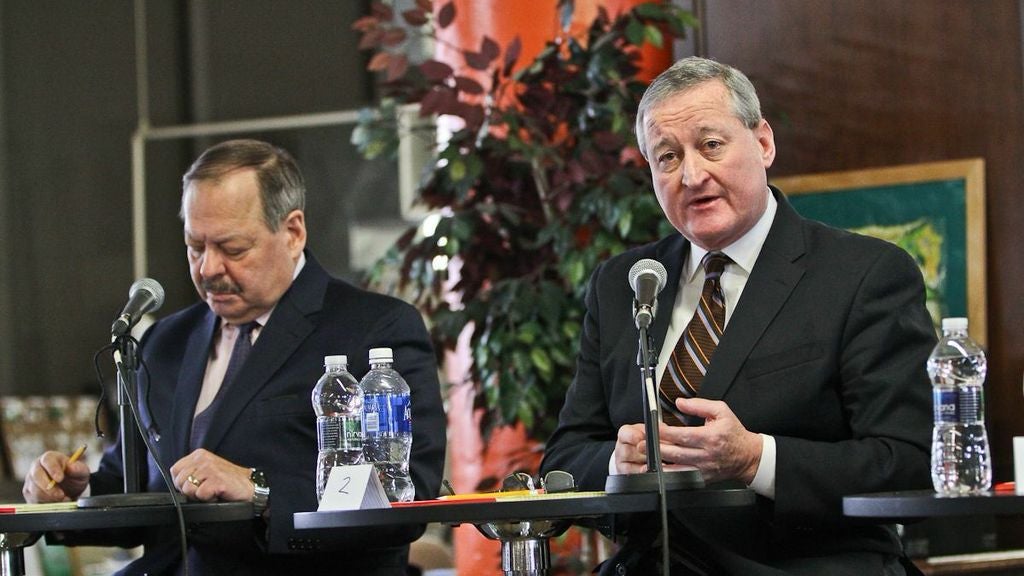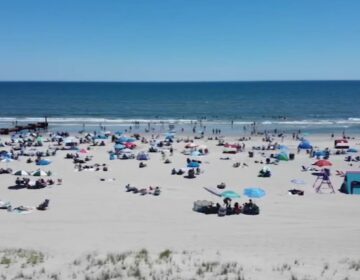Jim Kenney Part II: The candidate discusses leadership, job creation and his path to victory

Jim Kenney fields a question at a recent mayoral forum in Parkside. (Kimberly Paynter/WHYY)
In the second part of NinetyNine’s recent interview with mayoral candidate Jim Kenney (the first part is available via this link), the recently former city councilman talks about leadership, lessons learned from former mayors and, among other things, why he entered the race late.
NinetyNine: Let’s talk about leadership, about going from being one of 17 councilmembers to being a lone executive, a buck-stops-here position.
Jim Kenney: You’re not a lone executive. If you’re a lone executive, you’re going to fail.
I’ll give you a basketball analogy: I think in order to be a very effective mayor, you need to be a very effective point guard. You have to run the offense. You have to pass. You have to assist. You have to make all the other players on the team look good. And, the teams wins.
If you’re out there making yourself look good, and that’s all you care about, no one else is really going to care to help you.
So, the Ed Rendell model was ‘everyone under the tent.’ Didn’t matter if they were Rs or Ds. If they could help the city, you had a relationship with them, and you tried to help them with their stuff.
99: What lessons have you learned from former mayors?
JK: Building relationships and asking people to do stuff that they wouldn’t normally do and convincing them to do it whether that’s an event, project or program, or doing things they wouldn’t normally be prone to do. Leading them and encouraging them to do things.
I think the other thing I learned from Ed Rendell is that you have to have some fun. Things need to be fun sometimes. It can’t be all doom and gloom. He was very good at the technical parts of it with his staff and himself, but he was also very good at the fun stuff.
99: Can you give us some examples?
JK: Instead of being in your car driving down Broad Street on a nice day, he’d get out. It’d drive the police crazy when he jumped out of the car and just started walking and talking to people. Or, taking food off your plate (laughs). I mean, who does that? He’s endearing, ‘Ya eating that? Gimme that?’ It’s a common-man, common-person approach that I think endeared him to people.
Returns to the question about lessons learned from previous mayors
JK: John Street. I learned from him that you have to have nine votes to pass anything, and he had seven or eight in his pocket everyday, and that’s why he was effective at what he did. You can agree or disagree with his policies or approach, but what he needed to get done, he got done. He also knew every nuance of government. It was very, very impressive.
Michael [Nutter] is wonkish like that, too. He knows a lot about government and some of the biggest changes that he’s put in — the new ethics reform and this attitude. The inspector general recovered some $40 million worth of fraud, waste and abuse in the time she’s been there. That’s a significant shift of taxpayer resources to the right spot instead of going to the wrong spot. Those are the kinds of things I think he’s done well at.
99: But is he too serious?
JK: When you’re with him personally, he’s not serious. He’s pretty funny. I mean, he and I in high school were pretty hysterical. On the football team, the two of us — he left a year before me — were pretty comical, and we had a lot of fun doing it. He’s got a good sense of humor.
I can’t put my finger on it. I don’t want to be too critical. He’s got one year left, and I think he’s brought us through a terrible situation when it came to the economic realities of the country and world as it affected the city.
He had to make a lot of decisions that made people unhappy. And he did it, to his credit.
99: Do you think he’ll ever get full credit for that?
JK: I can’t project what history’s going to think.
In my mind, I’ve taken everything that I was upset about with the administration and I’m letting it go. You just concentrate on the stuff that was good and you try to build on it and move it forward and make it better than he did. I really have no specific complaints. A lot of it is, in the moment, when things are going on, things are tough and hot, and there’s an issue, yeah, there’s a little back and forth. But I think, in general, we’re all in this profession and we all have to respect one another, give each other some slack.
99: If there was a moment when you weren’t going to run for mayor, when did that shift to you were going to run for mayor?
JK: I had been getting to the point of no return by not resigning and then I got to a point when there was a little bit of back and forth, ‘Well, this isn’t going to work out this time. Let’s start planning the council re-election.’ I was going to do, maybe, one term.
Then, all this happened with Ken [Trujillo]. There were two other times in my career when I could have run that I didn’t. And this time was, I’m 56; in eight years, I’ll be 64. I’m not old, but I’m still not as young as I am now, so the time was right to do it.
It became a very liberating decision, and I’m enjoying it. I intend to win, but life [after] not winning is not a bad thing either.
99: Take us back to the moment when you found out Trujillo was leaving the race. Did you see a Tweet? Read an article?
JK: No, no. I got a call saying, ‘I can’t tell right you now what’s happening but start thinking about running.’ That was Ken [Snyder] in his kind of cryptic way. I kind of knew. I said, ‘Something’s up, so let’s pay attention and see how it goes.’ And then I met all these guys [Trujillo’s staff] and they’re awesome; I had a lot of confidence in the campaign staff. It’s a great working relationship. I’m enjoying the interaction with the folks who are working here. I know why Ken Trujillo was recommending them.
99: That must have made it a lot easier, having that structure in place.
JK: I had a framework. They were all volunteering so getting up to the point where I was ready to raise money to pay people, they were all here on their dime. No one was paying them, so I appreciate that. We’re at full steam now.
We get an alert that there’s time for just two more questions.
99: Ok. Why should people vote you?
JK: Because I care. Because I have the experience and the ability to make a difference, to make improvements and to change things. Not accomplishing my goals would make me very upset and I’ll think about this stuff.
I think I have the skills, the knowledge and the experience in government to be an effective mayor, and to get along well with my former colleagues in council, and to make substantive changes that I think will make people’s lives better.
99: What has to happen for you to win, and what do you have to avoid to make sure you do?
JK: I have to get more votes than anybody else.
99: Beyond that.
JK: We do analyses of vote totals in certain wards, who comes out [to vote] historically.
What I have to do is put myself out there in a positive way, talk about positive issues, talk about things that are substantive, that we have to change, fix or improve, and I don’t worry about the rest of it. Because, the rest of it, it is what it is or it’s not. So, for me to figure out ‘this person in, this person out,’ to me, it doesn’t matter.
If I’m not saying the right things for everybody in this city — no matter their racial or ethnic background, their age, or sexual orientation — if I’m not saying the right things, then they’re not going to vote for me.
If I am saying the right things, and they do believe that I’m being honest with them, and forthright, and that I care, then they will vote for me.
99: One last question that has been brought up, faintly, is the energy hub. One of Michael Nutter’s goals is to make Philadelphia the greenest city in America. Can we be a green city and also be a fossil fuel-based energy hub?
JK: It doesn’t have to be fossil fuel. It could be natural gas. It could be solar. It could be lots of things.
99: Natural gas is a fossil fuel, though.
JK: Right. It’s a less-impactful fossil fuel than crude.
Yeah. We can. We have to, because I need to put people to work and if we don’t expand Southport for the containerized potential that’s there, all the people worked hard to get the 45-foot dredge.
If PGW’s not going to be sold — apparently it’s not going to be sold anytime soon — we need to start making that company look like a private sector-run company held by the public. I need to professionalize the board. I need to professionalize other aspects of energy in the city with people from the energy business who know what they’re talking about, and also coordinate that with port opportunities for exports and those things.
I can’t effect what happens with a pipeline that comes here or doesn’t come here. I’m partly responsible for helping that happen.
I think the port is such a major asset. It happens to be owned by the state, but that doesn’t mean we can’t help make things happen down there.
If we can make investments to make things happen there, and I can guarantee contractually that city residents get ‘x’ percentage of jobs, that’s where I’ll be able to put people who maybe are not high-tech ready or biotech ready, maybe coming back in to society from incarceration, those are the places that those folks can work to make a decent living and raise a family.
You can train someone to work a forklift, to latch a container or to work in a warehouse. You don’t need a college degree to do that, and we have a big cohort of people who are in that situation and we need to change their lives.
99: And we’d have to extend the BSL down there.
JK: That’s a big project, and I think, obviously, SEPTA would be involved, and the commonwealth would be involved, and federal dollars would possibly be invovled, so you have to cobble all that together.
Let me tell you: I’m smart, but I’m not the smartest person in the room all the time, and I want smart people on the room. I’m not the be-all end-all. I don’t have every idea.
So, you need to keep on attracting smart folks and business people — the private sector — and government people can help you get your things accomplished.
WHYY is your source for fact-based, in-depth journalism and information. As a nonprofit organization, we rely on financial support from readers like you. Please give today.




